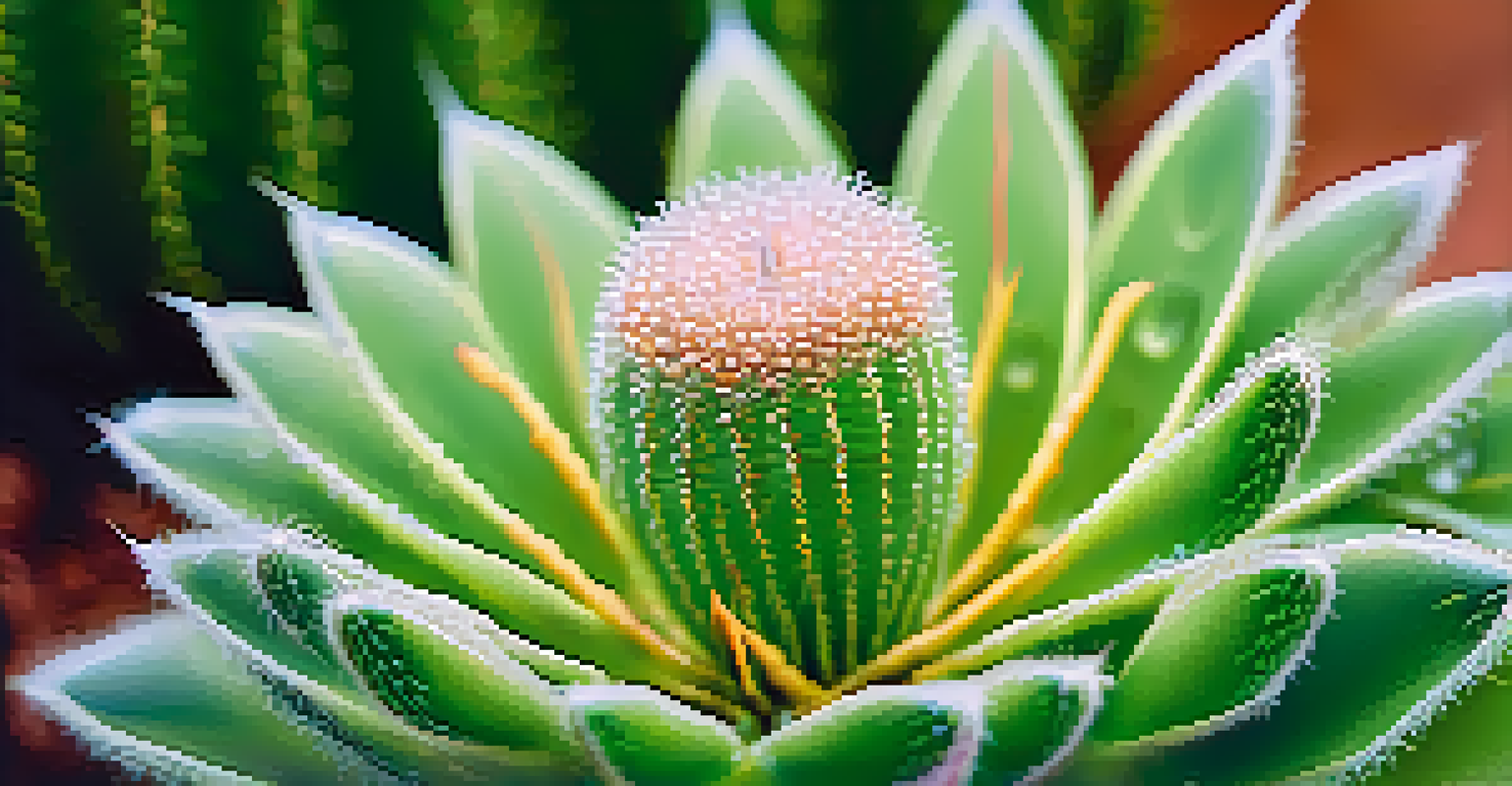Peyote's Role in Healing: A Scientific and Spiritual Inquiry

Understanding Peyote: A Brief Overview
Peyote, a small cactus native to Mexico and the southwestern United States, is rich in the psychoactive compound mescaline. Traditionally used by Indigenous peoples in spiritual rituals, it has a long history of being celebrated for its mystical properties. Beyond its cultural significance, peyote has also garnered attention in modern research for its potential therapeutic benefits.
The use of psychedelics in therapy has the potential to transform lives by allowing individuals to confront their deepest fears and traumas.
Often associated with visionary experiences, peyote is consumed in various forms, including dried buttons or as a tea. These experiences can lead to profound insights and emotional healing, which many users report. Its unique chemical composition has intrigued scientists, leading to studies exploring its effects on mental health and well-being.
As we delve deeper into peyote's role in healing, it's essential to recognize both its historical context and its emerging relevance in contemporary discussions about mental health treatments.
The Science Behind Peyote and Mescaline
Mescaline, the active ingredient in peyote, interacts with serotonin receptors in the brain, particularly the 5-HT2A receptor. This interaction is believed to be responsible for the altered states of consciousness that many users experience. Scientific studies suggest that these changes can lead to enhanced emotional processing and a sense of interconnectedness.

Research indicates that mescaline may help alleviate symptoms of anxiety, depression, and PTSD. In clinical settings, it has shown promise in fostering therapeutic breakthroughs, allowing patients to confront deep-seated emotions and traumas. This aligns with the idea that psychedelics can provide a new perspective on personal challenges.
Psychedelic Healing Potential
Peyote, containing mescaline, shows promise in alleviating mental health issues like anxiety and depression through its unique psychoactive effects.
While more research is needed to fully understand its mechanisms, the findings thus far highlight the potential of peyote as a tool for healing, bridging the gap between ancient practices and modern psychological therapies.
Cultural Significance of Peyote in Healing Practices
For centuries, Indigenous cultures, particularly in North America, have utilized peyote in spiritual ceremonies. These rituals often focus on healing and personal growth, emphasizing a connection to nature and the universe. The communal aspect of these ceremonies fosters support and understanding among participants, creating a safe space for healing.
Psychedelics are not just drugs; they are tools for healing that can provide insights into the very nature of our consciousness.
In these cultural contexts, peyote is not merely a substance but a sacred teacher that guides individuals through their emotional and spiritual journeys. The use of peyote in these ceremonies is often coupled with prayer, song, and communal support, enhancing the overall experience and its healing potential.
This cultural significance cannot be overlooked when discussing peyote's role in healing, as it highlights the importance of community, spirituality, and tradition in achieving mental and emotional well-being.
Modern Therapeutic Approaches Using Peyote
In recent years, there has been a resurgence of interest in psychedelics as therapeutic agents, with peyote being at the forefront of this movement. Psychotherapists and researchers are exploring how mescaline can be integrated into therapeutic settings to enhance treatment outcomes. This modern approach combines traditional wisdom with scientific inquiry.
Therapies employing peyote often focus on integrating the psychedelic experience into the healing process. Participants may work with trained professionals to navigate their experiences, ensuring a safe and supportive environment. This integration phase is crucial, as it helps individuals make sense of their experiences and apply insights to their everyday lives.
Cultural Significance in Healing
The use of peyote in Indigenous rituals emphasizes community, spirituality, and the importance of traditional practices in the healing process.
As the stigma surrounding psychedelics diminishes, more clinical trials are being initiated to assess the efficacy of peyote in treating various psychological conditions, potentially paving the way for its acceptance in mainstream mental health treatment.
Potential Risks and Ethical Considerations
While peyote holds promise for healing, it's essential to approach its use with caution. As with any powerful substance, there are potential risks, including adverse psychological effects, such as anxiety or paranoia, particularly in unsupervised settings. Understanding these risks is crucial for anyone considering peyote for therapeutic purposes.
Moreover, ethical considerations regarding the use of peyote must be addressed, especially given its sacred status in Indigenous cultures. The commodification of peyote and its availability outside traditional contexts raises important questions about respect and cultural appropriation. It’s vital to honor the traditions and rights of Indigenous peoples as we explore peyote's healing potential.
Balancing the benefits of peyote's use in modern therapy with respect for its cultural significance is paramount in moving forward responsibly.
Personal Accounts: Healing Journeys with Peyote
Many individuals who have participated in peyote ceremonies share transformative stories of healing and self-discovery. These personal accounts often highlight the profound emotional release and clarity they experienced during their journeys. Such testimonials provide valuable insights into the potential of peyote as a healing tool.
For instance, some report a renewed sense of purpose and connection to the world around them, often describing feelings of love and acceptance. These experiences can lead to shifts in perspective, enabling individuals to confront past traumas or mental health challenges with newfound strength.
Emerging Research and Acceptance
Ongoing studies aim to integrate peyote into therapeutic settings, potentially transforming its role in modern mental health treatment.
These narratives not only validate the therapeutic potential of peyote but also emphasize the importance of community and support in the healing process. They serve as reminders that healing is a deeply personal and often shared journey.
Future Directions: Research and Acceptance of Peyote
As interest in psychedelics continues to grow, the future of peyote in healing looks promising. Ongoing research aims to clarify its effects, optimize therapeutic protocols, and expand our understanding of its benefits. As scientists and mental health professionals explore this ancient medicine, we may see a shift towards broader acceptance in clinical settings.
This evolving landscape suggests that peyote could play a significant role in integrative health, complementing traditional treatments and offering new avenues for healing. Education and awareness campaigns may further facilitate this acceptance, bridging the gap between ancient wisdom and modern science.

Ultimately, the future of peyote in healing will depend on respectful integration, rigorous research, and the recognition of its cultural significance, paving the way for a more holistic approach to mental health.